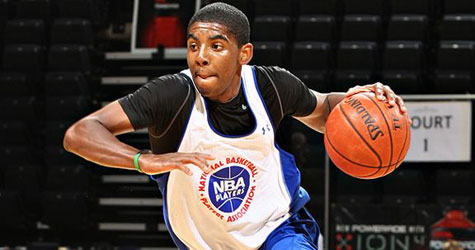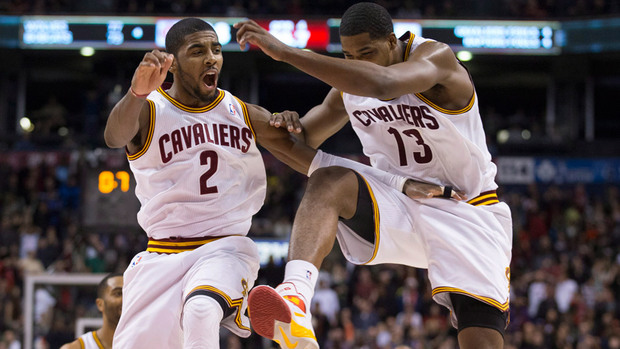
Two ESPN insider comments today. There were two articles posted yesterday, one of them was a critique of Kyrie Irving’s game by David Thorpe. The other identified “tentpole” (giggity) players who are capable of being anchors on a team, better known as “franchise players” or “not Chris Bosh”. Some of the guys on that list: Zach Randolph, LaMarcus Aldridge, Kevin Garnett, Andre Iguodala, Andrew Bynum, Monta Ellis and Al Jefferson. How did they come up with this list, Tom Haberstroh explains:
For the offensive component, we’ll use offensive PER, a cousin of John Hollinger’s PER, which you can find on 82games.com, that strictly looks at offensive production (no blocks or steals considered). Defense is less straightforward, so we’ll need to call in the ringers. We’ll package together three of the most comprehensive defensive metrics in the public forum: opponent PER, which tells us the PER of a player’s counterpart in the opposing lineup; defensive plus-minus, which tells us how the team defense improved with a player on the court; and Synergy Sports’ defensive efficiency rating, which uses countless hours of scout video tracking to assess a player’s defensive acumen. I combined the three ratings to come up with a rating that ranges from 1 to 100, in which 50 is average and 100 is the cream of the crop. That’s the defensive component. Both are on a 100-point scale.
So for example, LeBron James was a 100/97 (offense/defense), Randolph was a 94/65 and Monta Ellis was 76/27 (ouch on the defense bit). There’s a lot of stats out there which can muddy the waters when trying to analyze players, kind of like I did a few days ago when the Opponent PER. The Opponent PER completely discounts cross-switching, failed help assignments, and factors in defensive stats for the opposing player which skews the analysis the stat is primarily used for: to judge a player’s defense. Haberstroh’s tweaked the formula to get rid of the defensive stats, but it still neglects to factor the poor defense of other players on the team which lead to your man scoring. I think defensive plus-minus is great for rating bench players, and measuring their impact on the game. I would love to see aggregated +/- stats split based on the score differential in the game. This would account for teams making “runs” in blowouts, but at this point I’m complaining. The Synergy stuff I don’t know much about right now, but hope to soon. What do you think of Haberstroh’s metrics? Do they reflect a player’s impact/ability/talent well?
I can’t give you the whole list because it’s an ESPN Insider article, what I can do is move on and give you some info about the Kyrie Irving article by David Thorpe. Honestly, I’m like the Mother Theresa of ESPN Insider with all this giving.
If the Raptors do win the lottery or manage to be in a position where they have an opportunity to select Kyrie Irving, the PG of the future, here are some interesting observations from the very well-respected and The Doctor Is In guest, David Thorpe about Irving:
- A star who can be the MVP of a playoff series, but not MVP of the league.
- Brandon Roy at its peak with better playmaking skills. Can be very good at getting to the rim and finishing, great ball-handler. Can bounce-off bodies with the best of him. He’s drawing long comparisons with Roy, and basically saying he’s already on course to be better than him (healthy version).
- Not at Derrick Rose, Russell Westbrook on John Wall levels because he is not an uber-athlete. I very much agree with Thorpe here, athleticism at the point guard spot has never been greater, and when that athleticism is combined with speed and explosiveness, you get a player like Westbrook or Rose (not sure about Wall just yet). Irving has comparable, if not superior, skill to any of those guys, but he lacks in the dynamic aspect and that counts a lot these days.
- Thorpe says that Irving is a “small draft risk” at #1 because he can shoot the ball, which will always make him a solid contributor. He’s basically saying that in the worst case, Irving will be a very good contributor who, if taken #1, will not make fans regret picking him.
- When talking to phdsteve, Chris Denker of Netscouts suggested that Irving would be at least a year or two away from figuring out how to handle the NBA point. Thorpe is much more optimistic in this regard and the general theme of the article suggests that Irving is more NBA-ready than most credit him to be. Partially because he’s been performing at a high level for years which has bred a vital air of confidence in him.
- I’ll end with a direct quote which Raptors fans should pay close attention to: “The team that drafts Irving should do so knowing that it has its point guard of the future wrapped up for a decade or so.”
Before you start calling for Colangelo to trade up and grab Irving, remember this is the same David Thorpe who said Solomon Alabi would be good. Jury’s out on that for sure, that doesn’t stop me from subscribing to his Irving analysis.
—
Love Z-Bo, but this was too funny. Still remember this game.


